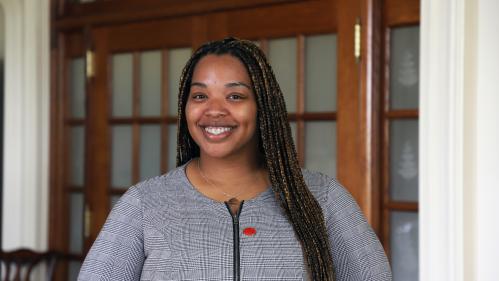Black Women's Voices: A Conversation with Douglass Director of Mentoring

During the height of the pandemic in 2020, staff and students at Douglass gathered over zoom to share the experiences of Black women in America. The zoom call would be the first of many spaces created, both in person and virtual, in a pivotal new program series at Douglass known as Black Women’s Voices. Black Women’s Voices is a mentorship focused affinity group by and for students and staff of Douglass College. Douglass Director of Mentoring, Madinah Elamin, was a founding staff member of the initiative and continues to lead its programming to this day.
“Black Women's Voices is an affinity group specially curated for students at Douglass Residential College,” said Elamin. “The group dialogues are encompassed by a series of intimate mentoring workshops highlighting the voices of Black women to help students navigate their experiences while at and beyond Douglass and Rutgers. Facilitators and speakers share in a myriad of academic and lifestyle conversations, offering students a safe space to be and exist outside of the everyday realm of having to perform.”
At each meeting, the group's conversations focus on various topics pertaining to Black women specifically, ranging from mental and reproductive health to discussions of family and gender. For several events, the group has partnered with the Douglass Black Student Congress (DBSC) as co-sponsors.
“Our programming seeks to be very student-centered, and informal,” said Elamin. “At each session there are Black women Douglass staff present, food to share, and dialogue. Together we discuss many aspects of what Blackness means and looks like at Rutgers, and Douglass more specifically.”
The Black Women’s Voices series is one of four affinity groups at the College. An affinity group is a space within the campus community to discuss issues faced by students from identities and cultures historically underrepresented or marginalized in higher education. Douglass affinity groups are open to all Douglass students. As Director of Mentoring, Elamin oversees each group, empowering students to carve out their own spaces at Rutgers.
“Campuses are not just made up of buildings and classes, but of the people who occupy them, and how these individuals move throughout different spaces,” said Elamin. “Currently, the Douglass community has four affinity groups."
Black Women’s Voices has its roots in the Africana community, a housing community for Black women first created by Black Douglass students in 1969. As explored in The Douglass Century, Black Douglass students staged protests in the aftermath of Dr. Martin Luther King Jr.’s assassination, calling for tangible, programmatic changes in the College’s curriculum and policies. Though initially resistant to reform, the College eventually responded by creating the houses. Today, the Africana community continues to house Douglass students as part of the Global Village Living-Learning Community.
“From our Africana community to our current Black Women's Voices affinity group, Douglass has a rich history of Black activism and culture on campus,” said Elamin. “The Black Women's Voices Affinity group is a natural extension of work done by and for our students to center their voices and experiences.”
For Elamin, affinity groups are essential for creating an affirming atmosphere for all students on campus.
“I encourage students to attend any affinity group programming that speaks to them. As students navigate college and attend classes, complete internships, lead student organizations, and all of the other things that college requires, we often forget the energy it takes to simply exist,” she said. “Our Douglass affinity group series allows Douglass students to remember that ‘you cannot pour from an empty cup’ and that being in community can be restful, celebratory, and empowering.”

